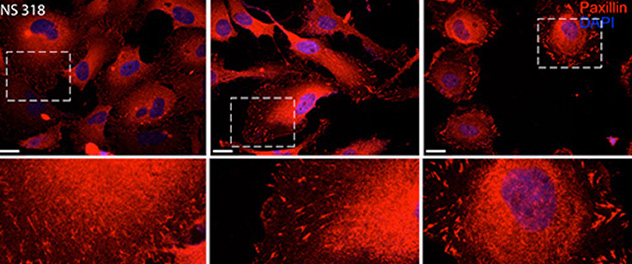
Analysis of cancer cell migration. The Brain Tumor Stem Cell Research Laboratory of Alfredo Quinones-Hinojosa, M.D., uses patient-derived cancerous cells collected in the operating room to study their migratory and invasive properties. Published in PLoS BIOLOGY. 2012;10:e1001320. Used with permission.
Tumor Invasion and Metastasis
Research projects in the tumor invasion and metastasis theme of the Department of Cancer Biology aim to expand translational research on the processes that enable tumor cells to invade surrounding tissues, disseminate through the body and colonize distant organs.
Metastasis is responsible for the majority of cancer-associated deaths. By developing treatment approaches that target invasion and metastasis, we aim to significantly reduce cancer mortality. This is a largely unexplored area for the development of novel therapeutic drugs because the molecular mechanisms that mediate cancer invasion and metastasis are still poorly understood.
To this end, the research team of Nhan L. Tran, Ph.D., is defining how signaling pathways converge to mediate cancer cell invasion, cell growth and cell survival in order to identify novel targets that can serve as points of therapeutic intervention. Several projects in Dr. Tran's laboratory focus on glioblastoma, which is a highly invasive and deadly form of brain cancer. Glioblastoma cell invasion increases resistance to chemotherapy. The group's research goal is to develop new treatment strategies that can better target these drug-resistant infiltrative cancer cells and proliferating cells.
The research team of Hugo Guerrero Cazares, M.D., Ph.D., also studies the mechanisms that regulate the migration and invasion of glioblastoma cells. Dr. Guerrero Cazares' research group is particularly interested in the impact of the surrounding tissue on the invasive nature of glioblastoma cells. The team incorporates novel cell-specific proteomic tools to better understand the impact of the tissue microenvironment on glioblastoma aggressiveness.
The research team of Alfredo Quinones-Hinojosa, M.D., studies different migration patterns of human glioblastoma cells in culture and within the brain. Using specialized novel microfluidic devices, the team can evaluate the migration behaviors of glioblastoma tumor samples from patients. The group's research goal is to use these observations to predict cancer outcomes and to develop tools for individualized medicine.
The research team of Steven S. Rosenfeld, M.D., Ph.D., studies molecular motor proteins that are critical for cell motility and invasion in glioblastoma. The team investigates these intracellular machines by using a combination of genetic and pharmacologic approaches, coupled with live cell microscopy and transcriptomics. A major goal of Dr. Rosenfeld's research team is to identify points of therapeutic intervention that can simultaneously inhibit invasion and growth of glioblastoma.
The goal of the research team led by Rajappa S. Kenchappa, Ph.D., is to identify factors that regulate the migration and invasion of glioma cells, leading to development of effective new therapies against glioblastoma. Specific factors under investigation include the microtubule-modifying enzyme alpha tubulin acetyltransferase 1 (ATAT1), neurotrophic tyrosine receptor kinase (NTRK) alterations caused by gene fusions, and the neurotrophin receptor p75NTR. Dr. Kenchappa's team also seeks to apply these strategies to understand and treat brain metastasis of melanoma, breast cancer and lung cancer.
The research team of Debabrata (Dev) Mukhopadhyay, Ph.D., also focuses on defining fundamental mechanisms of tumor invasion and metastasis and applying these discoveries to develop targeted cancer therapies. The group has a specific focus on the role of the VEGF family of signaling proteins on early metastasis of pancreatic cancer and renal cell cancer, as well as the invasiveness of glioblastoma.
The research team of Panagiotis Z. Anastasiadis, Ph.D., studies how dysregulation of adhesion proteins including E-cadherin and p120 catenin contribute to cancer cell invasion and spread. Research focus areas in this group include glioblastoma and particularly aggressive subtypes of breast cancer. The group's research goal is to find points of intervention that can control the progression and spread of these tumors.
The research team led by Derek C. Radisky, Ph.D., studies how cooperative interactions between tumor cells and their surrounding microenvironment promote tumor growth, invasion and metastasis. Specific interests include how heterogeneity in cancer-associated fibroblasts, inductive signals from adipocytes, and cooperation with vasculature contribute to the invasion and metastasis of breast and lung tumors and how these interactions can be targeted for therapeutic benefit.
The research team led by Evette S. Radisky, Ph.D., studies how the activities of proteases and protease inhibitors in the tumor microenvironment can drive tumor invasion and metastasis. Several of these proteases are well-validated drug targets, and yet treatments targeting these proteases have been hampered by a lack of drugs with sufficient selectivity. Dr. Radisky's research team is working to develop new therapeutics based on natural human proteins that are engineered to selectively target the proteases that drive metastasis. Specific projects focus on new therapies for highly aggressive subtypes of breast cancer and ovarian cancer.